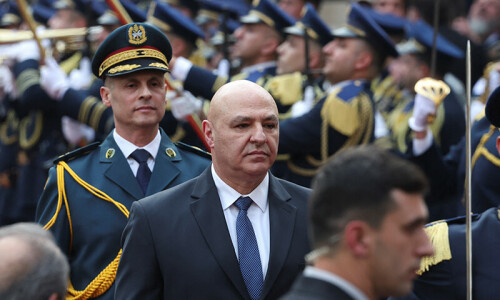LONDON The price of cheddar is going to go up by 10 per cent over the next six months. This is quite a rare food story, now, in terms of price rises it's localised; it pertains directly to British weather conditions (too wet - cows don't like it); it feels containable, finite. This makes it a marked contrast to the general run of agricultural stories, which foretell total disaster.
The UN this week made its report, tangentially about food, foreseeing price hikes, shortages and wars, all plausible consequences of the world's failure to halt biodiversity loss.
This issue was widely reported in 2007-08, but global recessions are at least good for something, and the spike in food prices fell back. As the economy picks back up, so does the cost of feeding yourself. When even the cheese-eating developed world is hit, things are much worse in developing countries.
Studies in 2008 yielded some data on the impact of expensive food not just the obvious results, some people starving, some people substituting cheaper, lower-quality nutrition; children are taken out of school; people go without medicine; in urban areas there are riots.
So I was a bit surprised to read the ad for MoneyWeek magazine which gave, in its list of helpful features, “How to profit from higher food prices”. It's just so bald, isn't it? This phenomenon, both directly and indirectly, has already killed people and will kill many more.
In India, lentil prices have tripled since 2008; urban families typically spend 55 per cent of their income on food. Even if gambling on food insecurity weren't likely to destabilise the situation further, it would still be a little bit tasteless, wouldn't it? You'd never see Homes and Gardens running a story on what bargains you get when people's homes get repossessed, or Elle passing on fat-busting tips discovered by chance in a refugee camp.
I called MoneyWeek for a comment, but Wednesday is their busy day. I'm sure they wouldn't have been embarrassed. Capitalists capitalise - it's what they do. They never pretend to have a moral compass.
Nevertheless, the market - in the shape of business leaders, interpreted by city analysts - retains a bearing of authority. It presents itself in loco parentis over the childish hubbub of politics; bankers and “business leaders” pass judgment on what kind of government would suit them best. On what basis could anyone without morality claim authority over anything?
Traditionally, on the basis that they are perfectly rational that, free of morality (which is a passion of sorts), they are liberated from the heat of the human condition and can make cool, logical decisions. Each player may be motivated by self-interest, but self-interest will at least assure stability, since chaos serves no one.
That would be some consolation if it were true, but we don't even need to look back a year to see what hogwash it is. Markets panic, and that alone makes them dangerous. Even worse is this behaviour, described by Chuck Prince, former CEO of Citigroup “As long as the music is playing, you've got to get up and dance,” he said in 2007, justifying the overleveraged loans his bank was still making. They're not in the least bit rational, these people - or they simply accept that if their position runs counter to what peers and competitors are doing, that in itself makes it irrational. The crash and its causes all gave an insight into herd behaviour, but the whole caper is delinquent, manic and riotous.
It's been de rigeur since 2008 to talk about “greedy bankers”. That doesn't really do it, though - greed is a broad and inadequate explanation for the bizarre spectacle of a cohort that is proud of its own unscrupulousness, amused by its own hysteria and yet self-righteous and unshakeable in its demands for political influence and respect.
I've come reluctantly to the conclusion that the problem is not the busted humanity of the people themselves but the process of engaging with financial markets. It divides people from themselves. It voids their sense of shame, and even the magazines that serve them are shameless. The pursuit of money has to be undertaken with no rules if you want to be a human being afterwards, fine, give the money away — but in the making of it, you're basically a wolf. —Dawn/The Guardian News Service












































Dear visitor, the comments section is undergoing an overhaul and will return soon.